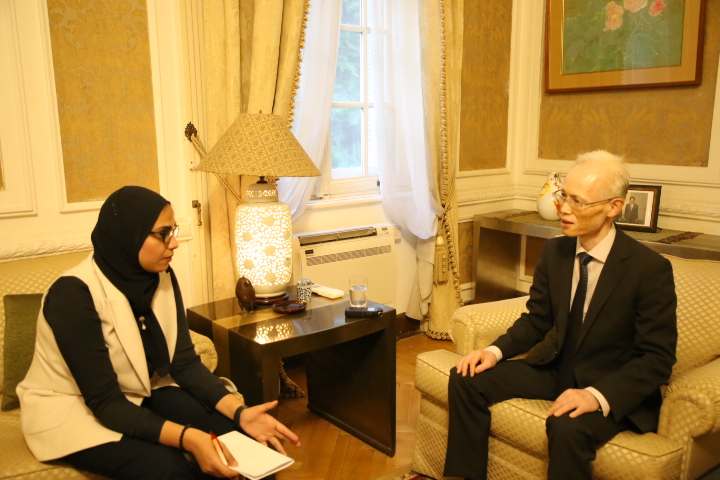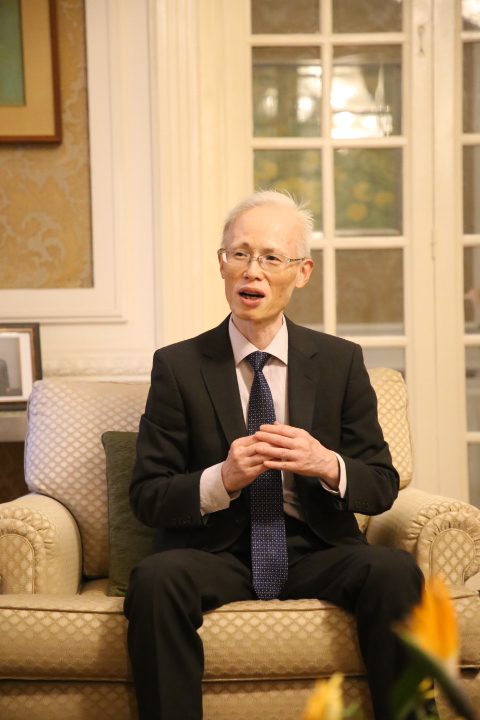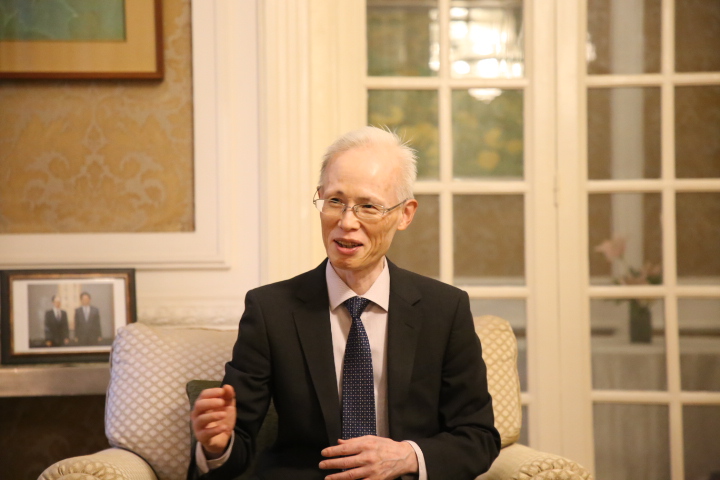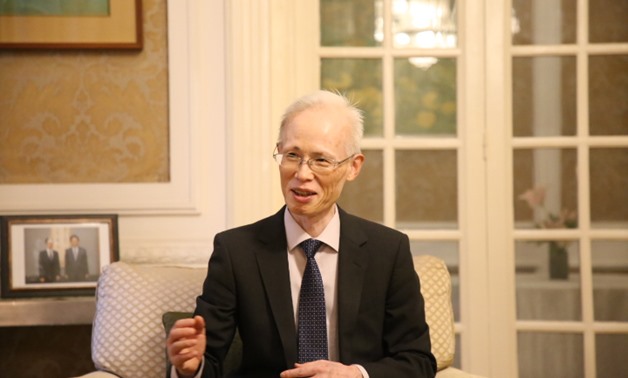CAIRO – 14 September 2019: Japan hosted last month one of its biggest business events, the seventh edition of TICAD, meant to raise awareness of importance of investing in Africa’s development among leaders, governments, international organizations and private sector.
Egypt, represented in President Abdel Fatah al-Sisi, co-chaired the summit, in his capacity as the head of the African Union, along with Japanese Prime Minister Shinzo Abe.
Egypt Today sat with Japanese Ambassador to Cairo Masaki Noke, who was attending the summit himself, and shared his views and insights on Japan’s long-time support to the continent, besides Egypt’s debut co-chairing of the summit.
In the below lines is the interview with Mr. Noke
How do you evaluate the TICAD7 summit in terms of active participation and signed agreements?
First, I would like to say that TICAD7 was successful with a high level of active participation. During the summit, we agreed on terms of themes of quality infrastructure, micro-economic stability, human resource development, peace and security, and taking good note of the initiative of the free and open Indo Pacific.
When I met with Investment Minister Sahar Nasr this week, she said that TICAD7 was very successful because of three reasons: first is that the participation was not limited to public and private sectors, but also there were international institutions as active participants and this was very important to fill the financial gap.
Second, the meeting conferences were very action oriented, as there were transactions, besides 100 MoUs were announced including agreements related to Egypt.
Third, there is a great monitoring mechanism after the summit, in addition, President Sisi and Japanese Prime Minister Abe the two leaders agreed to establish a committee to promote business and investment.

Japanese Ambassador to Cairo Masaki Noke during interview with Egypt Today's Nourhan Magdi - Photo by Egypt Today
ET: Japan has been a supporter of African development for more than 30 years in different fields. What will Japan benefit by providing economic aid to African countries?
TICAD is different from other partnerships, which Japan initiated it in 1993. We had been working with other co-organizers, but as Africa has achieved a significant development, Prime Minister Abe called on for a new TICAD with double “I” (investment and innovation) to enhancing active participation of the private sector. This will result in achievements for both African and Japan through development assistance oriented approach.
Japanese Prime Minister Shinzo Abe pledged $20 billion more investments in Africa in the years to come. How can investments target strengthening connectivity across Africa? And what are the fields Japan will tap into in the continent?
First, we should work more to develop quality infrastructure through private investment. Japan supports building two major bridges over the Nile, in Uganda, and South Sudan. In Egypt, we work on water regulation through the official development assistance.
To achieve profitability for investments through engaging private sector, we need to: give the private sector the freedom to setup, apply an efficient viable method, besides, helping them away to hedge risks by providing them with governmental guarantees.
For areas of Japan’s investments, there is usually a large part of investment goes to energy and natural resources, they are of course very important, but there are lots of other interesting areas: agriculture, water and especially manufacture sector.
How is Japan’s style in investment different from others?
There is a very Japanese style in investment that we call it “Make with Japan” rather than “Made in Japan.” For example: Sumitomo Tires is a manufacturer of auto parts, they hire 5,000 Egyptians, and plan to enlarge. Nissan hires 1,000 Egyptians, applies much more labor-intensive production method in Japan. They adopt powerful human resources, and contribute to employment.
Japanese companies requested incentives from Egyptian government to encourage investments. How do you think the discussions are coming?
Egyptians has an inaccurate understanding that Japanese companies are competing with Chinese ones. However, the competition should be between Egypt, Turkey and Morocco. Japan has to choose the best place to invest, and then to export to Europe.

Japanese Ambassador to Cairo Masaki Noke during interview with Egypt Today - Photo by Nourhan Magdi/Egypt Today
Egypt has free trade agreements with different countries. It is important for Egyptian authorities to convince Japanese companies it is best to invest and produce in Egypt not in other countries. That’s why incentives are important, for example, morocco is providing extremely attractive incentives to automakers.
There is a problem that was raised by President Sisi regarding high prices of Japanese products that do not meet purchasing capabilities of the Egyptians. Would the Japanese gov’t encourage companies to reconsider the prices of the products they inject into Egyptian market?
Japanese government cannot instruct private companies regarding their investments in any country. We organize information and exchange sessions so that private companies understand the market needs and possibilities of development and economically activities. I believe Japanese companies would think about the best products to meet the market demand. But there are lots of misunderstanding about the cost in question.
I was in Japan during TICAD7, and when I took a taxi (Toyota) to Narita Airport, I asked the driver how many kilometers the car moved, he said 500,000 kilometers. And he is thinking to use to [the car] until it makes 700,000 kilometers, which is too many. If you pay 10,000 dollars for a car, that goes for 100,000 kilometers only. Calculating this, then you should pay for the Toyota taxi 70,000 dollars, while its actual price is 40,000 dollars only. That’s how the cost should be measured not as its face value or absolute number, but in terms of life cycle cost.
Are there new projects between Egypt and Japan, which are expected to enhance the long-standing relationship, especially after TICAD7? And will private investments be promoted?
First, we have to accomplish big projects like the Great Egyptian Museum, and the Egyptian - Japanese schools. We are also working on water regulators, Borg el-Arab Airport, Metro line 4, and exploring the possibility of developing cooperation in energy sector, through official development assistance.
On private sector, there are several ideas under discussions. We facilitate the procedures through an agreement aims to promote business, address hardships and difficulties so private sector can move more positively.
How do you think Egypt’s debut co-chairing of the summit could play a role to accelerate implementation of three pillars: economic transformation, sustainability and stability?
Egypt played a very good chairmanship role, co-chairing the meeting together with PM Abe, and facilitating discussion between Africans and Japanese, because it is not easy to communicate with more than 50 African states. The originality of TICAD is not a one-time meeting; there is a senior official level meeting, preparatory meetings.
We chaired the G20 this year, it is most important to have frank exchanges, but it is only for a few days, while chairmanship is for a one year term, during which there is an enormous quantity of works to do. We find cooperation with Egypt was very useful through an exemplary model of coordination; we hope to continue to work together with Egyptian counterpart, and accelerate the cooperation through achieving the three pillars.
Tell us more about the MoUs signed between Egypt and Japan during TICAD7 summit?
We signed two MoUs between Japan and African through Egypt, which we call a triangular cooperation: one between E-JUST (Egypt-Japan University for Science and Technology) and JICA, and another one between EPAD (Egyptian Partnership Agency for Development) and JICA.
The first MoU stipulates that E-JUST will accept 150 African students for three years, while the second MoU is the reinforcement of cooperation through EPAD (Egyptian Partnership Agency for Development) that has been receiving 2500 Africans from different countries in the continent.
These two examples are encouraging because they are not like Japan giving all finance to Egypt, but there is serious burden sharing by Japan side.
More African students are expected to be trained in Japan in the coming years under the Abe initiative, did the old batches include Egyptians, and is the initiative famous enough across Egypt?
PM Abe said that during the last five years, a total of 2,700 Africans had been trained in Japan. Abe initiative 2.0 aims to develop 3000 Africans in the coming six years.
Egypt is one of the most important partners in Abe initiatives, already 74 Egyptian trainees came to Japan under JICA program, and around 30 of them are currently studying engineering, business management, medicine, biology and information technology.
I cannot say if the initiative is famous enough in Egypt or not, but we need to do more effort to give it more publicity in Egypt.
Egypt and Japan are connected politically and economically, but do you think the Japanese language is a barrier in connecting citizens together, especially that not many Japanese do speak English?
Japanese is difficult for Egyptians, and Arabic is very difficult for Japanese, it is also one of my headaches. Japan is drastically changing; foreign visitors to Japan were 6 million in 2011, while last year the figure reached more than 31 million visitors. There is a big increase, not because Japanese suddenly began to speak English, but because Japanese is doing serious effort to become a country friendly for foreigners.
Egyptians are more talented in English than Japanese, they are able to learn and study in English, although it is recommended to learn Japanese too, only a few words can make a difference with Japanese people. Forty years ago, Cairo University began Japanese language education. I understand more than 1,000 Egyptians are learning Japanese language.

Japanese Ambassador to Cairo Masaki Noke during interview with Egypt Today - Photo by Nourhan Magdi/Egypt Today
With the Japanese high experience in waste management, is there any current/future cooperation with Egypt in this regard?
In June, a meeting between President Sisi and PM Abe at G20 summit, one of the agreements of the G20, is to reinforce international cooperation to cope with the plastic waste.
Japan chose Egypt as one of the partner countries to work on this issue through UNIDO. We will undergo analysis of the alternative materials that are friendly to environment, innovative packaging, recycling technology, plastic value chain and regulation. We would like to develop activities, to establish a public private platform between Japan and Africa, in order to produce and use more alternative materials to plastic.
How does Japan plan to support African Union strategy for gender equality and women’s empowerment 2018-2028?
We worked together with Egypt’s Cairo Cooperation Center for Peace Building on a theme of women peace and security, where we shared our experience, besides; we are key partner in this area with UN women. Japan further financed a part of a UN film on female genital mutilation in Egypt.
We have been supporting, for example, 14 projects of UN-Women in the amount of 12 million USD, as well as three projects of the Team of Experts on the Rule of Law and Sexual Violence in Conflict in the amount of 1.5 million USD. These include projects regarding women’s leadership, empowerment, access and protection in Kenya, Egypt, Iraq and Jordan, as well as projects addressing and preventing sexual violence in conflict in Iraq, the Central African Republic and the Democratic Republic of the Congo.
Japanese city of Osaka is preparing to host the Expo 2025, and looks forward to strong African participation. How do you think such major events would open the door for more investments in the continent?
That would be a great occasion for African countries, to promote their national profile. We expect tens of millions of visitors to Osaka Expo 2025. Osaka is a very popular city for tourists. I still remember when I was very young and attended the Osaka expo back in 1970 and I liked the pavilions; it looked wonderful city for me, where it impressed not only investors but children as well.




Comments
Leave a Comment